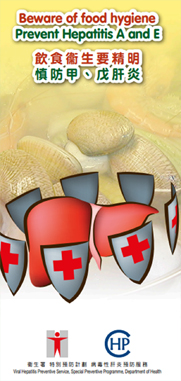Hepatitis E
- Hepatitis E is a liver disease caused by hepatitis E virus (HEV).
- The incubation period ranges from 2 to 10 weeks with an average of 5 - 6 weeks.
- Symptomatic HEV infection is most common in adults, with clinical features similar to other types of hepatitis, such as jaundice (yellowing of the skin and the whites of eyes), fatigue, abdominal discomfort and tea-coloured urine.
- Hepatitis E is generally self-limiting. In rare cases, it may result in fulminant hepatitis and death.
- Pregnant women with hepatitis E are at an increased risk of developing serious complications, such as acute liver failure and fetal loss. Up to 20 – 25% of pregnant women can die if they get hepatitis E in third trimester.
- Other high-risk individuals, such as elderly with major underlying illnesses, people with chronic liver diseases (e.g. people with chronic hepatitis B), transplant patients and people with glucose-6-phosphate dehydrogenase (G6PD) deficiency, may also develop severe illness when having HEV infection.
- Hepatitis E generally does not cause chronic infection; however, cases of chronic hepatitis E have been reported in immunocompromised people.
- The usual HEV causing human infection belongs to Orthohepevirus A (HEV-A).
- There are rare reported cases of human infection with HEV-C (also known as rat HEV), particularly in immunosuppressed people. The incubation period and mode of transmission are unknown at the moment.
Epidemiology in Hong Kong
- The annual number of reported cases of hepatitis E is less than 100 in recent years in Hong Kong.
- Hepatitis E is a notifiable infectious disease. Please click here for the statistics from the Centre for Health Protection.
Transmission of hepatitis E
- People with hepatitis E may excrete the virus in stools up to 3 - 4 weeks after the onset of disease.
- HEV is transmitted primarily by the faecal-oral route; that is when an uninfected person ingests the food or water that has been contaminated with the faeces of an infected person.
- HEV has been detected in pigs and pig livers. HEV can be transmitted through ingestion of undercooked meat or meat products, such as pig liver, of infected animals.
- Other rare transmission routes include transfusion of infected blood products, organ transplant and vertical transmission from a pregnant woman to her foetus.
- For human infection with rat HEV, the exact route of transmission is still unknown at this moment. Possible routes of transmission include direct contact with rodents or their excreta, or ingestion of contaminated food and water.
Diagnosis of hepatitis E
- Cases of hepatitis E are clinically indistinguishable from other types of acute viral hepatitis.
- Diagnosis is made by the detection of HEV-specific immunoglobulin M (IgM) antibodies in the blood or HEV ribonucleic acid (RNA) in blood or stool by test using reverse transcriptase polymerase chain reaction (RT-PCR).
Treatment of hepatitis E
- There is no specific treatment capable of altering the course of acute hepatitis E.
- Most infected persons can recover in 2 – 6 weeks after rest or receiving supportive treatment, such as relieving discomfort and replenishment of fluids.
- Hospitalisation is generally not required. However, hospitalisation is required for people with fulminant hepatitis and should also be considered for symptomatic pregnant women.
- People with chronic hepatitis E may require antiviral medication for viral clearance.
Prevention of hepatitis E
- Maintain good personal hygiene. Perform hand hygiene before handling food or eating. Flush the toilet after use and wash hands with soap.
- Maintain good food hygiene. Drink only boiled water. Eat only thoroughly cleaned and cooked food, especially bivalves such as oysters, clams, mussels and scallops, pork and pig offal. (For information on food safety, please click here and visit the website of Centre for Food Safety).
- Maintain good environmental hygiene. Treat contaminated water and sewage properly. Handle and store drinking water properly. Keep kitchens and utensils clean.
- There is no vaccine available for the prevention of hepatitis E in Hong Kong.
Health education materials
